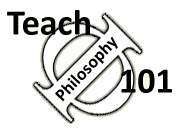Teach Philosophy 101
Free resources for
philosophy teachers!
"One of the most comprehensive, well-researched, and accessible guides for teachers that I have ever seen." James Lang, Chronicle of Higher Education (read full review of TΦ101)
The Paradox of Writing Instuction
We spend a lot of time justifying our humanities courses by telling our students, the administration, and ourselves that we are teaching students to write and that they will need to write well in many of the jobs that they seek. While it is true that they will need to write well, it is not clear that we are always teaching them to write in the way they will need to write to be successful in a lot of fields. The table below tries to capture what TΦ101 calls "the paradox of writing instruction." The general idea is that the kind of writing that students are sometimes taught to do in school is very different from the way writers who are really passionate about something actually write. In other words, a scholar who is a passionate about an exciting idea, or the head of a non-profit firm trying to convince someone to fund a project, or an employee trying to persuade a company to go in a new direction may have to unlearn some of the habits picked up in school.
Bridging the Gap
So how do we get students to learn some of the skills they will need when they are actually writing about things they care about? Here are a few strategies that TΦ101 has learned from others and has been exploring:
-
Change the audience. There is no substitute for teaching students to write a thesis-driven essay. Good writers need to learn this. But a steady diet of school-papers can also create bad writing habits. Peter Filene suggests "changing the audience" for student writing by having students write not for the professor but for specific audiences outside the classroom (81). One professor at TΦ101's institution, for example, has a writing assignment on the Bhagavad Gita that requires students to write advice to the players on the basketball team, based on the principles in the Gita. TΦ101 has had very good success with having students create websites. Mary Beth Simmons, at Villanova University, has her advanced students prepare their final paper for publication and submit it to a journal. Other teachers require their students to add something to a Wikipedia article. These techniques don't substitute for writing an academic essay, but by supplementing those tasks may help students care more about what they are writing.
-
Encourage peer editing, reviewing, and rewriting. TΦ101 has a number of tips on peer editing. Many campuses also have a writing center, where students can take drafts of their papers. When they are doing their own work, recovering academic writers will often consult with colleagues about their written work, and often go through multiple drafts before submitting their work for public scrutiny. Having them do this in their academic writing prepares them for what they will experience when they leave the academy.
-
Have students explore different genres of writing. As we said, writing a five paragraph, thesis-driven essay is a valuable skill for students to learn, but it isn't the only kind of writing available. Hillary Clemens at Brigham Young University -Idaho has students turn the same writing assignment into different products. A research paper, for example, can also be turned into a press release. One very useful exercise is to ask students to reduce a longer piece of writing to a very minimalistic word count. Several students have commented to TΦ101 that in all of their years of formal education, no professor has ever asked them to make anything shorter.
-
Set maximum page and word lengths, not minimum ones. In TΦ101's experience, no one in the "real world" gives you a minimum length for something you are writing; indeed, "shorter is better" is what you hear most often, even in academic journals. One alum reported now in law school reported that the professor reprimanded students for using the expression "whether or not" instead of "whether" since the "or not" was just filler. So one way to get students to start thinking in these terms is to say "your paper may not be more than 750 words in length" rather than saying, "your paper has to be at least x pages." Another approach is to ask students to condense longer papers into shorter formats for different audiences. One student, struggling to condense a term paper into a 500 word webpage asked, "does my name count as two of the 500 words?" It was a learning moment.
How high school teachers grade student essays. A number of years ago there were some experiments to develop "robo grading" software, that would grade high school essays. Indeed, the software that was developed did a pretty good job emulating the grades given by English teachers. A New York Times article, however revealed what was most interesting about this effort; the software worked mostly by correcting grammar and selecting for big words and complex sentences -- "plethora" got you a higher grade than "many." Is is no surprise, then that this is how many of our students write. And often our job is to teach them new habits.
Sources:
Filene, Peter. The Joy of Teaching: A Practical Guide for New College Instructors. Chapel Hill: University of North Carolina.
Author: John Immerwahr
Update: June 30, 2012
